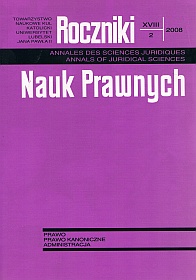The Commissioning of Public Tasks by Local Government as a Form of Colaboration Between Bodies of Public Administration and Non-Governmental Organisations
Abstract
The commissioning of public tasks by bodies of public administration, in the light of Art. 5, par. 1, sub-item 1 of the law on public benefit activity and volunteerism, is one of four forms of cooperation with non-governmental organisations and entities listed in Art. 3, par. 3 of the law which carry out public benefit activities within the territorial reach of the administrative bodies and within their scope.
The form of cooperation, defined in Art. 5, par. 1, sub-item 1 of the law, consists in delegation of a task which is included in a territorial government’s catalogue of own public benefit tasks to be performed by non-public entities that are not regarded as part of the public finance sector. Hence, a particular public task (or part of it), which by virtue of the regulations regulating the structure of local government units is to be carried out by all such bodies, can be performed by NGOs as well as entities enumerated in Art. 3, par. 3 of the law on public benefit activity and volunteerism, making use of public resources.
The unit of public administration that commissions the performance of a public task is obliged to monitor and evaluate the performance of the task, especially the following:
– progress of the task;
– quality of performance;
– appropriate use of public resources received for the task to be realized;
– necessary documentation, provided for by relevant regulations and provisions of a given contract.
Copyright (c) 2008 Roczniki Nauk Prawnych

This work is licensed under a Creative Commons Attribution-NonCommercial-NoDerivatives 4.0 International License.


